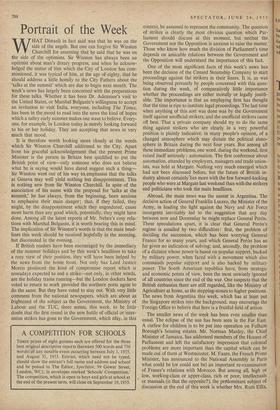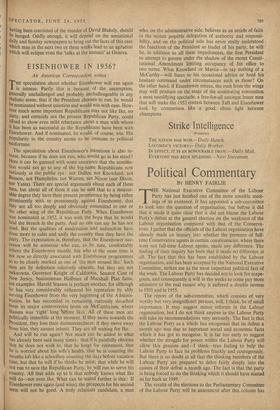Portrait of the Week
WHAT Disraeli in fact said was that he was on the side of the angels. But one can forgive Sir Winston Churchill for assuming that he said that he was on the side of the optimists. Sir Winston has always been an optimist about man's dreary progress, and when he acknow- ledged the statue of him which the City of London has com- missioned, it was typical of him, at the age of eighty, that he should address a little homily to the City Fathers about the 'talks at the summit' which are due to begin next month. The week's news has largely been concerned with the preparations for these talks. Whether it has been Dr. Adenauer's visit to the United States, or Marshal Bulganin's willingness to accept an invitation to visit India, everyone, including The Times. has been in the mood to read into the news the kind of hopes which a sultry early summer makes one want to believe. Every- one, for example, 'in London today is merely looking forward to his or her holiday. They are accepting that news in very much that mood.
It is therefore worth looking more closely at the words which Sir Winston Churchill addressed to the City. Apart from his graceful acknowledgement that the present Prime Minister is the person in Britain best qualified to put the British point of view—only someone who does not believe what he is saying would have dared suggest such a thing— Sir Winston went out of his way to,emphasise that the talks at Geneva may well yield nothing but disappointment. This is nothing new from Sir Winston Churchill. In spite of the association of his name with the proposal for 'talks at the summit,' he has always, from the beginning, been anxious to emphasise their main danger: that, if they failed, they might, by the disappointment which they engendered, cause more harm than any good which, potentially, they might have done. Among all the latest reports of Mr. Nehru's cosy rela- tions with Marshal Bulganin, it is worth bearing this in mind. The implication of Sir Winston's words is that the main head- lines this week should be received hopefully in the morning, but discounted in the evening.
If British readers have been encouraged by the immediacy of the summer holidays and by this week's headlines to take a rosy view of their position, they will have been helped by the news from the home front. Not only has Lord Justice Morris produced the kind of compromise report which is nowadays expected to end a strike—not only, in other words, are the holiday trains running—but the London dockers have voted to return to work provided the northern ports agree to do the same. But they have voted to stay out. With very little comment from the national newspapers, which are about as frightened of the subject as the Government, the Ministry of Labour and the TUC, there seems, this week, to be little doubt that the first round in the new battle of official or inter- union strikes has gone to the Government, which ntay, in this context, be assumed to represent the community. The question of strikes is clearly the most obvious question which Par- liament should discuss at this moment, but neither the Government nor the Opposition is anxious to raise the matter. Those who know how much the division of Parliament's time depends on amicable relations between the Government and the Opposition will understand the importance of this fact.
One of the most significant facts of this week's news has been the decision of the Cunard Steamship Company to start proceedings against the strikers in their liners. It is, as was being observed privately by people concerned with this ques- tion during the week, of comparatively little importance whether the proceedings are either morally or legally justifi- able. The importance is that an employing firm has thought that the time is ripe to institute legal proceedings. The last time when anything of this sort was done was by the Government itself against unofficial strikers, and the unofficial strikers came off best. That a private company should try to do the same thing against strikers who are clearly in a very powerful position is plainly indicative, in many people's opinion, of a changed atmosphere which may dictate the political atmo- sphere in Britain during the next four years. But among all these immediate ptoblems, one word, during the weekend, first raised itself seriously : automation. The first conference about automation, attended by employers, managers and trade union- ists, was held at Margate. Nothing very much emerged which had not been discussed before, but the future of British in- dustry almost certainlilies more with the few forward-looking people who were at Margate last weekend than with the strikers and politicians who took the main headlines.
Abroad, the main news was the unrest in Argentina. The decisive action of General Franklin Lucero, the Minister of the Army, in leading the fight against the Navy and Air Force insurgents inevitably led to the suggestion that any day between now and Doomsday he might replace General Peron. These speculations apart, it is clear that General Peron's regime is assailed by two difficulties : first, the problem of deciding the succession, which has been worrying General Franco for so many years, and which General Peron has so far given no indication of solving; and, secondly, the problem of a dictator whose power is based on popular support. backed by military power, when faced with a movement which also commands popular support and is also backed by military power. The South American republics have, from strategic and economic points of view, been the most unwisely ignored of all countries since the end of the war. One suspects that the British embassies there are still regarded, like the Ministry of Agriculture at home, as the stepping-stones to higher positions. The news from Argentina this week, which has at least put the Singapore strikes into the background, may encourage the Foreign Office to believe that here is a fruitful field of action.
The smaller news of the week has been even smaller than usual. The eclipse of the sun has been seen in the Far East. A curfew for children is to be put into operation on Fulham Borough's housing estates. Mr. Norman Manley, the Chief Minister of Jamaica, has addressed members of the Houses of Parliament and left the satisfactory impression that colonial problems are more important than the capital which can be made out of them at Westminster. M. Faure, the French Prime Minister, has announced to the National Assembly in Paris what could be (or could not be) an important re-examination of France's relations with Morocco. But among all, high or low, working-class or upper-class, rich or poor, intellectuals or manuals (is that the opposite?), the predominant subject of discussion at the end of this week is whether Mrs. Ruth Ellis, having been convicted of the murder of David Blakely, should be hanged. Oddly enough, it will depend on the sensational daily and Sunday newspapers to bring out the facts of this case Which may. in the next two or three weeks lead to an agitation Which will eclipse even the 'talks at the summit' at Geneva.


















































 Previous page
Previous page